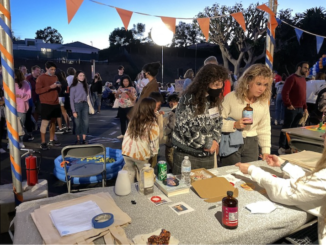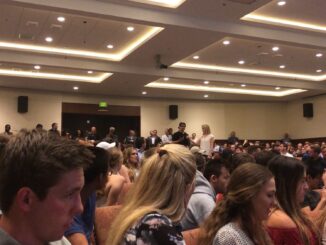
Veterans signed a blank check to the United States, offering as much as their own lives in service.
The Pepperdine community is working to give back to those who served by funding tuition gaps and providing support services. But veterans’ proponents on campus stress more could be done.
“It’s easy and fast to say to someone thank you for your service,” said Political Science Professor Dan Caldwell, a Navy veteran and founder of Pepperdine’s Committee on Student Veterans. “But institutions should be able to do better than that and provide some tangible thanks and gratitude for the service members of the military have given.”
With the Serviceman’s Readjustment Act, or the G.I bill, veterans receive benefits for themselves or their dependants to attend college or a trade school for 36 months, but according to the U.S. Department of Veteran Affairs, the amount of the benefit is monetarily limited. In 2008, Congress passed a provision to the act, the Yellow Ribbon Program, in order for veterans to have more educational opportunities.
With the Yellow Ribbon Program, Pepperdine has been able to support more veterans. A decade ago, there were fewer than 30 student veterans across Pepperdine’s five schools. Today there’s 377 student veterans at Pepperdine, and the number is rising. There are several veterans within Pepperdine’s faculty and staff. Further, in a Pepp Post poll of 50 students, 84 percent said they have family who are veterans or currently serving and 72 percent said they have friends who are veterans or serving.
However, because the program and influx of veterans at Pepperdine has been within the last decade, Pepperdine’s overall support of veterans and their families is still a work in progress.
The Yellow Ribbon Program
The Yellow Ribbon Program allows U.S.-based institutions of higher learning to agree to fund up to half of a veteran’s tuition expenses and the VA will match the other half to fully fund a veteran’s education. Pepperdine offers unlimited tuition contributions through the Yellow Ribbon Program to an unlimited number of eligible student-veterans.
At Pepperdine, 72 percent of student veterans qualify for the Yellow Ribbon Program, allowing them to attend Pepperdine tuition free, according to a Pepperdine webpage on the university’s ranking.
Kyle Irwin, a junior advertising major who is also an Air Force veteran and member of the Air Force Reserves, receives full tuition.
“I was kind of afraid to come here, because I wasn’t sure how a private school would be, but they offered me a great deal here,” Irwin said. “With the Yellow Ribbon Program everything was completely covered.”
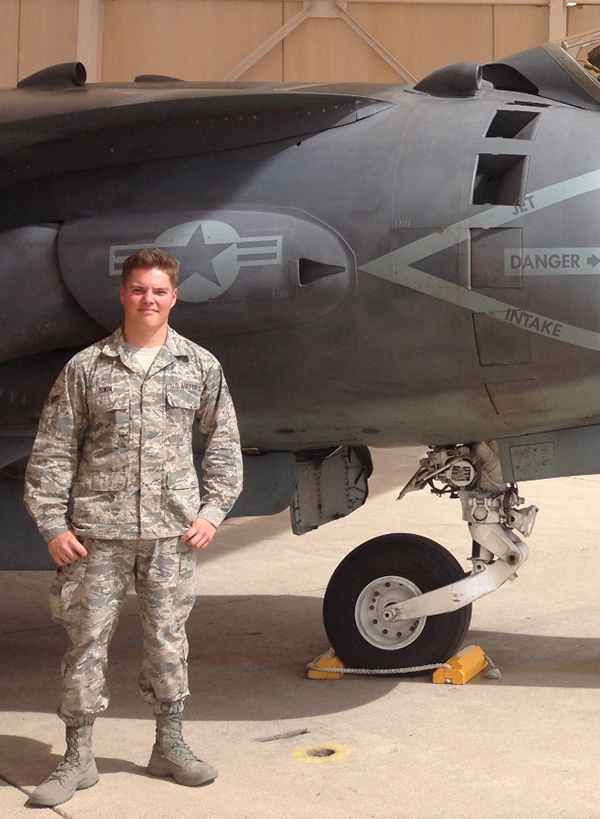
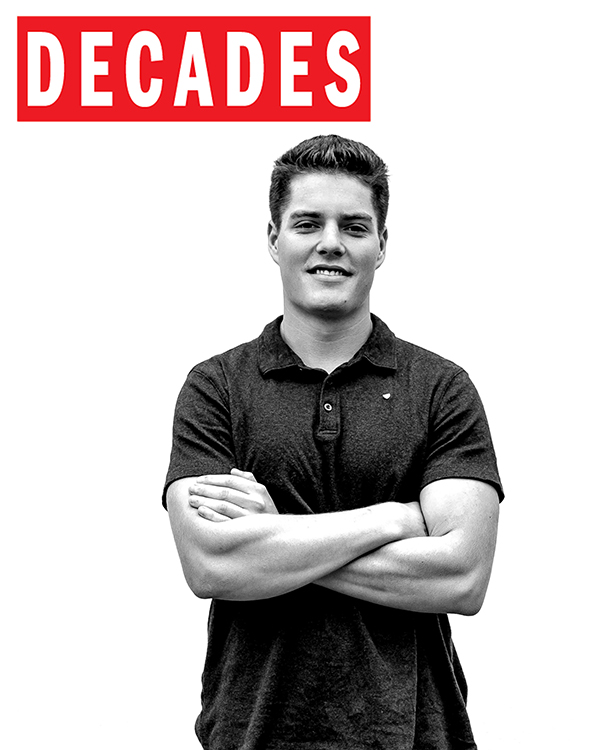
To cover tuition for all qualifying veterans, Pepperdine has set aside a large budget that will continue to grow as more student veterans enroll at Pepperdine.
“Last year it was a budget of $2.6 million for the 320 student-veterans we had,” Caldwell said. “That’s a major commitment I’m really proud of because it shows Pepperdine is serious about the program.”
While some schools across the country limit how much of their annual budget goes to student veterans, Pepperdine does not. Since Pepperdine adopted the Yellow Ribbon Program in 2009, Pepperdine has never put a cap on the number of Yellow Ribbon students accepted each year. Pepperdine has worked with the VA to give every Yellow Ribbon student a yearly stipend for books, a housing allowance and health insurance coverage through the university.
Bryan Reeder, one of two registrars who directly work with Seaver’s student veterans, sees Pepperdine’s adoption of the Yellow Ribbon Program as a proper way to acknowledge the service members’ commitment to the country.
“Pepperdine is a university that is placing the value of what these people have done over money,” Reeder said. “Every year we have a symbolic gesture for veterans with the planting of the flags during 9/11 that’s great in its soul stirring but what I admire most about Pepperdine is that we go beyond the symbolic and into the practical. We aren’t only visually saying thank you for our service, but we do it through the Yellow Ribbon program.”
Lack of knowledge of the Yellow Ribbon Program
Although the Yellow Ribbon Program is 10 years old, general knowledge of the program is still lacking both in the military and at Pepperdine.
“I think the Yellow Ribbon Program is like the best kept secret in the military,” Irwin said.
Sara Turki, who is the other registrar working with Seaver student veterans, has heard complaints about the lack of advertising of the program.
“From what I’ve heard, when recruiting, the biggest tool of the Yellow Ribbon Program is through word of mouth,” Turki said.
Laws preventing private universities from promoting on military bases limits how Pepperdine can inform enlisted service members that Pepperdine is a Yellow Ribbon school. However, people agree Pepperdine should try other ways to advertise veteran programs.
“I think we could do a lot more with the recruitment for Seaver,” Caldwell said.
Sarah Ha, a Pepperdine sophomore business administration major who is using her father’s G.I bill as a dependent, also believes Pepperdine needs to better advertise veteran programs at Pepperdine.
“We could improve by maybe spreading awareness of the veteran programs as they’re not very heavily advertised or mentioned too often within the community,” Ha said.
Because of the lack of advertising, general students don’t even know they attend a Yellow Ribbon school. The Pepp Post survey found only 24 percent of students surveyed said they knew Pepperdine was a Yellow Ribbon school and 76 percent said they didn’t know or were unsure.
Bailey Laughlin, a junior integrated marketing communication major, didn’t know of the Yellow Ribbon Program, and neither did her boyfriend who was interested in Pepperdine last year when he got out of the Marine Corps.
“We had no idea Pepperdine was a Yellow Ribbon school,” Laughlin said. “When we did the math, even with his G.I. bill benefits he couldn’t afford Pepperdine. He’s happy where he’s at now but it would’ve been helpful to know.”
Isabel Cornavaca, a sophomore psychology major who works in the Pepperdine Volunteer Center, said she thinks more students should be aware Pepperdine is a Yellow Ribbon school.
“I honestly didn’t know Pepperdine was one until this year,” said Cornavaca, whose boyfriend is in the Navy. “But it’s something the PVC workers and more students should be more aware of.”
Transitioning into college life
Those not connected to the military should also understand that each veteran or loved one of a veteran has their own unique experience of transitioning into the civilian world. This is especially true for college life.
“I’ve been blessed to have a good transition into college but I know a lot of guys who stay in because they really feel they can’t do anything else, “ Irwin said. “My buddy is a Marine infantry sergeant and he has such a high-speed job where he’s working with crazy stuff and he feels he can’t go work a regular job.”
Nick Michaelson, a United States Marine Corps veteran, father and business administration major, said the social transition was difficult.
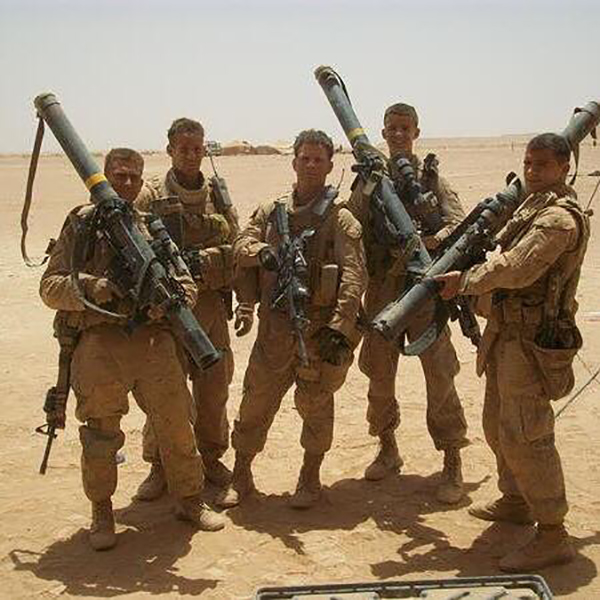
“As a student veteran especially, you’re so much more isolated than you’ve ever been,” Michaelson said. “It’s hard going from brotherhood, comradery, sisterhood, to a school environment where you’re older.”
Michaelson said a lot of the older student-veterans face personal challenges at Seaver they must overcome while attending school that other undergraduate students don’t often have to face.
“Every veteran on undergraduate campus here that I’ve talked to is struggling in a major way either financially, personally, or family wise from being older,” Michaelson said.
For example, few Pepperdine undergraduates are fathers like Michaelson.
“There’s not too many people on campus for a 30-year-old veteran with a kid to come to and say hey I’m not doing so well,” Michaelson said.
Jonathan Santini, a U.S Navy Veteran and math major, also felt that connecting to younger students can be hard when transitioning to college.
“It’s definitely different being surrounded by 18-year olds and hearing their conversations and their concerns about life because they are in a totally different stage of existence,” Santini said, “but there’s plenty of older, non-traditional students at Pepperdine who Pepperdine faculty made sure I was introduced to.”
The families of veterans also experience challenges with transitioning into college themselves, or helping their veteran family member transition into college. As a sophomore Ha can still see how her college experience is affected by her experience growing up as a military child.
“It’s not easy being from a military family,” Ha said. “It’s difficult to have ‘childhood friends’ and life just moves so fast that it almost feels like you can’t settle down, so even in college I don’t get attached to too many friends, which can be a bad thing.”
This year Rizma Shrestha, a former military spouse, recently helped her husband Albert Velasco apply and transition from the Marine Corps to college. Although she already has a degree herself she still experienced transition struggles.
“I am super glad I had always prepared him for college way before he got out. That’s the reason I think he didn’t really have any hard times fitting right into it,” Shrestha said. “However, I did have a hard time adjusting to the transition because I was so concerned with making sure his needs were fulfilled that I forgot about myself. I feel like everyone gives 100 percent support to veterans but not as much to spouses.”
Military awareness
Another issue in Pepperdine’s support of veterans is the lack of understanding and awareness from the general Pepperdine community about the military and veterans.
“I feel that sometimes civilians aren’t aware of the magnitude or significance of their military’s contributions,” Ha said. “Pepperdine has students from more privileged backgrounds that might not genuinely understand military service.”
Santini also felt that students not connected to the military may not understand the gravity of the contributions made in the military.
“I wish students knew about the kinds of people who volunteered to do the hardest and most dangerous things in the military. I was lucky to get a glimpse of those people,” Santini said. “You will never find a greater concentration of people in the same place who will all go through the most arduous, torturous training voluntarily in order to just have a chance to be a part of the forces who actually make a difference in fighting terrorism.”
Most civilians have little to no knowledge of what veterans did while serving in the military, which adds to the disconnect between civilians and veterans.
“In class when people find out I was in the military they just assume I was like a tank driver in the Army,” Irwin said. “I’m so used to it I don’t always correct them that I work in intelligence in the Air Force.”
Caldwell has heard similar accounts of student veterans’ military service not being understood at Pepperdine.
“I had a student veteran who was in Marine Recon. come speak to me in my office, and I said that it was impressive,” Caldwell said. “He said to me, ‘you’ve heard of that?’ and I said yes … and he smiled and said you’re the first person I’ve met at Pepperdine who knows what Marine Recon. means.”
Caldwell believes there should be a greater sensitivity and consciousness toward those issues veterans face.
“There could be more programs focused on veterans, the military, and kind of services veterans perform,” Caldwell said, “I also don’t think students realize that the families are deeply affected by the members of their family that are serving.”
Pepperdine’s veterans community also includes international students who served in their home countries.
Jonathan Chan, is a sophomore business administration major from Singapore, a country where military service is mandatory. Han has already served two years in the Singapore Army, and is required to serve 14 days of every year until he is 55 years old before he can officially retire from service.
“It was a very defining moment of my life to serve in the national service,” Chan said. “… While Pepperdine helped me as an international student adjusting in a foreign country, Pepperdine didn’t specifically help me to transition from military to college life.”
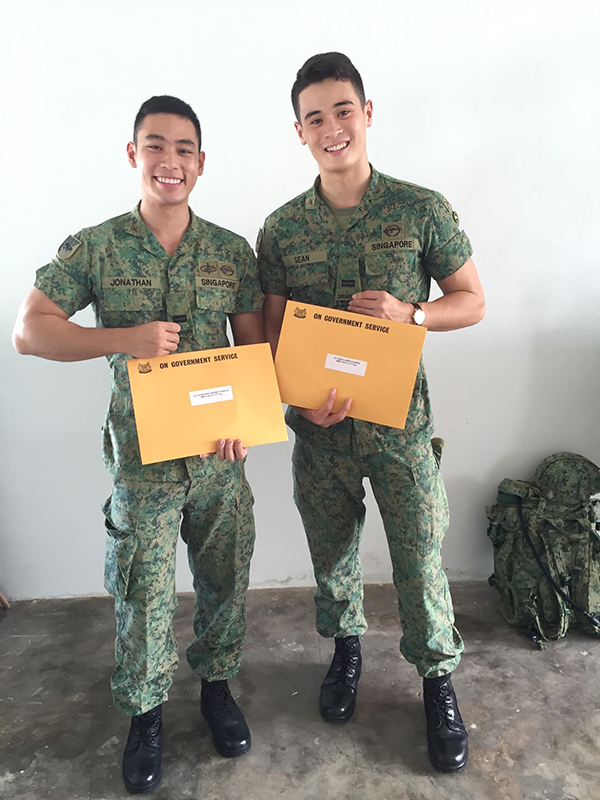
Michaelson said lack understanding about veterans leads students to feel intimidated by veterans or see them as different.
“Some of these guys on the undergraduate campus are pretty cool guys; starting their own businesses before they even got their degree, they’re entrepreneurs, they like to have fun too,” Michaelson said. “They’re just people too.”
Resources for veterans and their loved ones
Besides the Committee on Student Veterans, the only other main support for veterans are the student-veteran lead veteran’s clubs at Seaver, Graziadio, and the Pepperdine School of Law. Asa Miller, the president of Seaver’s student veteran organization was unavailable to be interviewed. Other students said the student-veteran lead clubs help veterans transition into Pepperdine and connect them with other veterans. Pepperdine’s Inter-Club Council funds the student lead veterans clubs.
“I saw their veteran program was voted very awesome and outstanding and I decided to attend here because of that,” Michaelson said, “but since I’ve been there there are a lot of things that could be better.”
Student veterans suggested several key areas for improving support for veterans and those directly impacted by the military, including improving mental health resources for veterans and their families, adding full-time faculty positions solely for veterans and making a designated center for veterans.
Both Reeder and Turki believe Pepperdine could provide a designated center for veterans on campus as well as have more employees designated to assist veterans.
“I have an open-door policy, my office is always open,” Turki said, “but they should have a space with a computer lab, just an area where they know is their respected space.”
Reeder and Turki are the only two Seaver registrars tasked with helping veterans. They have formed connections with student’s veterans so that veterans now come to them for a variety of issues.
“Our time is limited because we don’t just work primarily with veterans, so more veterans dedicated staff would be helpful,” Reeder said. “Our duties are equally divided. Sara takes half and I take half. We are the only two that work here.”
Sometimes, veterans have needs neither registrar is trained to meet.
“We assist and serve to the best we can but there are times our vets need a different type of support Bryan and I can’t give,” Turki said.
Those with connections to the military at Pepperdine suggested the need for a designated support group or counselors equipped to support veterans. Currently, the Pepperdine Counseling Center only has one counselor on the Committee on Student Veterans.
“It’s hard to talk to someone who doesn’t have that military connection or experience,” Cornavaca said. “Having a professional or a group who is prepared and knows how to connect to veterans, siblings, spouses, or anyone impacted by the military would be nice.”
From Michaelson’s own personal experience seeking support through the Pepperdine Counseling Center, he also believes Pepperdine could improve the support offered at the center.
“I think it’s awesome that it’s here,” Michaelson said, “ but the severity of some of the stuff veterans have gone through I don’t think is covered as much, and not just for veterans. I understand young kids go through some terrible, terrible things so trauma specialists, I think, would be very helpful.”
Moving forward
Ultimately the Pepperdine community lives by the motto, “Freely ye received, freely give,” and because of this many are open to providing more support for veterans.
The poll showed 54 percent of students surveyed said they believe Pepperdine should do more for veterans, and in an anonymous comment section on the poll students voiced they want there to be more awareness about veterans and they want to be more involved in supporting veterans on campus.
“I’ve met really great people here at Pepperdine,” Irwin said, “whenever people find out I’m a veteran they’re always really excited and want to know more. It’s been a really great experience.”
For those currently looking to better support veterans, Michaelson has a simple solution.
“Just talk to vets, that’s the best solution,” Michaelson said.
Eve Lovato completed the reporting for this story under the supervision of Dr. Christina Littlefield and Dr. Theresa de los Santos in Jour 241 in spring 2018. Dr. Littlefield supervised the web story.


